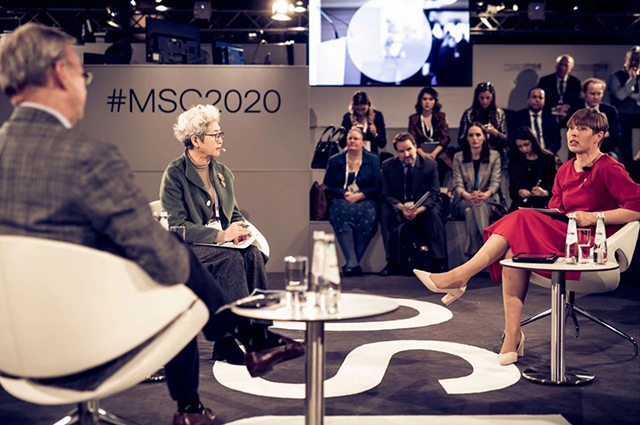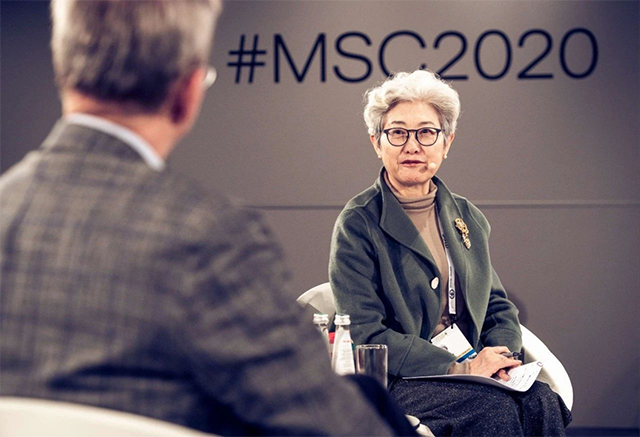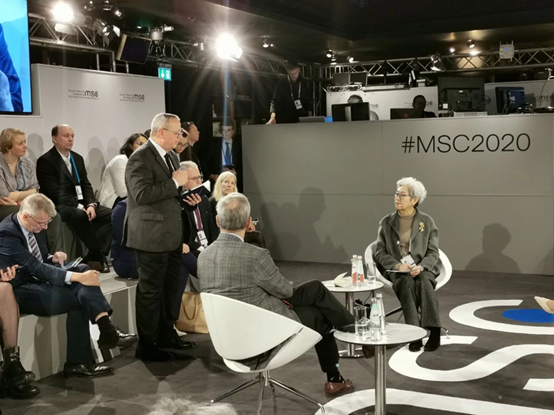On the afternoon of February 15, 2020, Fu Ying, Chairperson of CISS, and Eric Schmidt, Chairman of the National Security Commission on Artificial Intelligence (NSCAI) and former Google CEO, were invited to have a dialogue in Townhall on AI of Munich Security Conference 2020. Estonian President Kersti Kaljulaid moderated the townhall, and John Allen, President of the Brookings Institution commented on the dialogue. The Town on AI was organized by the NSCAI and focused mainly on the development of AI and the challenges brought to employment, personal privacy, values, etc.

Schmidt said in his speech that AI is helpful in assisting humans with their work. For example, AI can help doctors in diagnosis and operations. He believed that the R&D and application of AI is not aimed at replacing humans with machines. Although some people are worried that AI may be aware of itself one day and some even think of the scene in Terminator where humans are enslaved by machines, it is too far off since today’s technology has not been able to equip AI with self-awareness. What Schmidt worries is not the “singularity” that may appear soon, but the undesirable consequences brought by errors of AI for the time being.
Fu stated that it is fortunate for China to usher in a good time for AI application which is enabled by new advances of science and technology, as the Chinese economy has seen rapid growth for a long period and solid foundations have been established for science and technology and even the manufacturing sector. This will provide China with more opportunities and profits. The application of AI has a far-reaching impact on the economy and industries: while boosting productivity and efficiency, it can exert negative effects at the same time, as evidenced by its impact on the pattern of employment. According to the report by CISS titled Risks and Governance of AI from the Perspective of Chinese Youth, more than 50% of young people worry about the risk of becoming unemployed and fear that they cannot make good use of what they have learned after entering the society. However, like all the previous technological revolutions, AI will replace most of the formulaic jobs but create new jobs and opportunities at the same time. It is therefore necessary for the governments of all countries to consider how to build an effective system to make adjustments and adapt to new demands brought by changes in employment structure.

Schmidt deemed that we can counter the impact of automation on employment by investing more in education and training. For China, where the aging of population is getting worse, AI can play a significant role. That is because automation can take the place of humans to carry out more manual work, improve the productivity and thus relieve the pressure on social production from the decrease of the youth population.
Both of the guests held that protecting personal privacy and using new technology are not contradictory. Speaking of the legislative challenges associated with AI, Fu said that given the quick iteration of AI technology, the cycle of rule establishment and law formulation must be shorter than that in any traditional model. Sometimes, challenges might have appeared or even become sticky before a social consensus reached, and they would change quickly. Yet, the overly early and prospective establishment of rules can also restrict the development of technology. Thus, legislations and regulations on AI technology are a hard nut to crack in modern governance. In response to this problem, governments and industries all over the world are now proactively working to find a way out. Fu shared what she had learned during her field research trips in Shanghai and Shenzhen. For example, some healthcare companies promise to protect clients’ privacy by adopting “data masking”. For most companies, it is important to obtain as much data as possible for algorithms’ model-training capacity, rather than collecting private
From a technological point of view, Schmidt said that the model training of algorithms does not require the data of all human beings on this planet; instead, the process aims to collect a certain amount of data to build a model and then apply it to more scenarios. He insisted on the necessity to protect the privacy of people who are using AI products, and pointed out that this requires more international cooperation and China and the US share great promises for cooperation in this field.
When asked by the audience whether differences between the Chinese and Western values would affect the application of AI, Fu answered that ordinary Chinese do not differ much from Western people when it comes to some underlying principles in technological application and international exchanges, and they also recognize basic values like peace, prosperity, human rights and privacy. However, there may be many differences over the way to interpret and describe the values. She then took the Regulations on Cyber Protection of Children’s Personal Information, which was released in China in September 2019, as an example. Schmidt stressed that ensuring effective human control is an important measure to safeguard human values: as there are data biases in data collection, AI may violate some basic values of the mankind when being applied in practice. It is thus indispensable to strengthen education of technical personnel, deepen cooperation among governments, scientists and engineers and make increased efforts to study and implement AI ethics.
John Allen, President of the Brookings Institution, shared his views on the application of AI in the military arena and relevant ethical issues. He said that using AI in warfare can improve military efficiency, reduce casualties and facilitate decision-making. Nevertheless, while recognizing the strategic advantages brought by this new technology, we need to cope with the tough problem of maintaining effective human control. Ethical supervision should be incorporated into the design and use of AI, so as to reflect and safeguard the US values.

The NSCAI, organizer of MSC Townhall on AI, was established in 2019 and has become an important part in a series of AI-oriented institutional efforts of the US Congress and the government in recent years. Its establishment shows that the US has considered AI as a national security issue and will provide integrated guidance on the development of AI nationwide in a top-down manner, further improve the supervisory chain of AI and join forces of all parties to lay an important foundation for the expedited development of AI.
By Zhu Rongsheng
